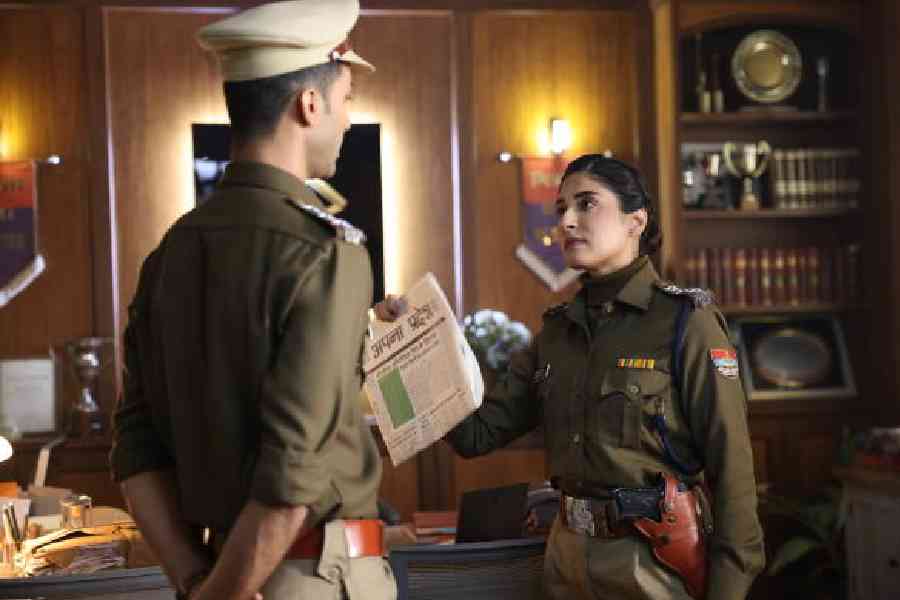The past informs the present. The present determines the future. The future is a mirror of the past and present.
Combining all these oft-heard and much-experienced truths of life into a mostly entertaining, if sometimes frustrating, watch is Gyaarah Gyaarah, an eight-episode series on Zee5. Blending a police procedural, a semi time-travel thriller and an emotional drama focusing on love and loss, Gyaarah Gyaarah is the latest co-production from Dharmatic Entertainment and Sikhya Entertainment — whose maiden collaboration gave us Kill, which is still playing in theatres and whose success has already spurred the announcement of a Hollywood adaptation.
A glitch in the space-time continuum setting off concurrent timelines and causal loops, alternate universes and multiple avatars, has been explored many times on screens big and small, most successfully in shows like Dark and Black Mirror. In 2018, the latter even released a version called Bandersnatch where viewers, at both critical and non-critical junctures, were given choices that enabled them to decide the endgame of the story, with five main endings with multiple alternatives packed within them, leading the audience down a wormhole of infinite possibilities.
Gyaarah Gyaarah is an official adaptation of the Korean series Signal. What Signal did in 16-odd episodes is attempted by Gyaarah Gyaarah in eight. The results are mixed.
The good thing is that though parts of it may prove to be overly vexing at times, Gyaarah Gyaarah is guaranteed to keep one constantly engaged. That is chiefly on account of its theme itself — two cops ‘communicating’ with each other, their respective present-day being more than a quarter of a century apart — and working within their own timelines to solve overlapping cases, their race against time actions often influencing, and sometimes altering, the past, present and future.
Can the dead and the alive exist at the same time? Can two different realities coexist? Can different versions of the same person live in different timelines? Can an infinite chain of cause and effect lead everyone in both worlds to relive the same fate over and over again? Is every death a new beginning? Like most other titles in the genre, Gyaarah Gyaarah has a theme that calls for suspension of disbelief. Whether that results in a satisfying payoff is debatable — you may see the process, I may look at the result.
As the title suggests, Gyaarah Gyaarah is sparked off by Carl Jung’s 11:11 theory. The founder of analytical psychology theorised that this magic number on the clock is a ‘cosmic wink’ that reflects deeper patterns and connections that lie beneath the surface of our conscious reality. It is seen as an example of synchronicity and a favorable sign for manifestation. That I am writing this on the date of 8/8 is telling.
Directed by Umesh Bisht, whose last outing was the social satire Pagglait, Gyaarah Gyaarah hits the ground running, with a team of cops in Uttarakhand — what better than the hills to conjure some gloom and doom atmospherics? — putting all hands on deck to solve a 15-year-old kidnapping and murder case of a minor, before the Statute of Limitations, which has decreed that all cases gone cold must be disposed off with.
It is in the middle of this feverish police procedural that rookie cop Yug Arya (Raghav Juyal) finds a battery-less walkie-talkie spring to life one night at the hour of 11:11. On the other end of the communication, interrupted by static, is cop Shaurya Athwal (Dhairya Karwa), also working on the same case. Except that Shaurya is in 2001, the year the case took place, and Yug is in 2016, which is the present-day of the show. We are, of course, in 2024, with fingers crossed that the show’s ‘lite’ treatment of complex theories like Infinite Loop, Schrodinger’s Cat and Bootstrap Paradoxes doesn’t force it downhill.
What is commendable about Gyaarah Gyaarah — with a solid Kritika Kamra leading from the front — is that it contextualises Signal and roots it in the Indian ethos. That results in minimal dumbing-down of the original, a fact that many Indian adaptations of complex international storylines are guilty of.
Shaurya and Yug’s one-minute communication — it just lasts the 60 seconds of 11.11 — enables the two to not only solve cases together (involving everything from serial killing to rampant gangsterism) but also work within their own timelines to shift and alter past, present and future.
It helps that all the three principal actors are in good form, with a special mention for Juyal. And while we wait for Season 2, we just wish that the eight hours spent in getting to the end of the first season didn’t leave us with that infuriating end. I, for one, felt quite cheated.










